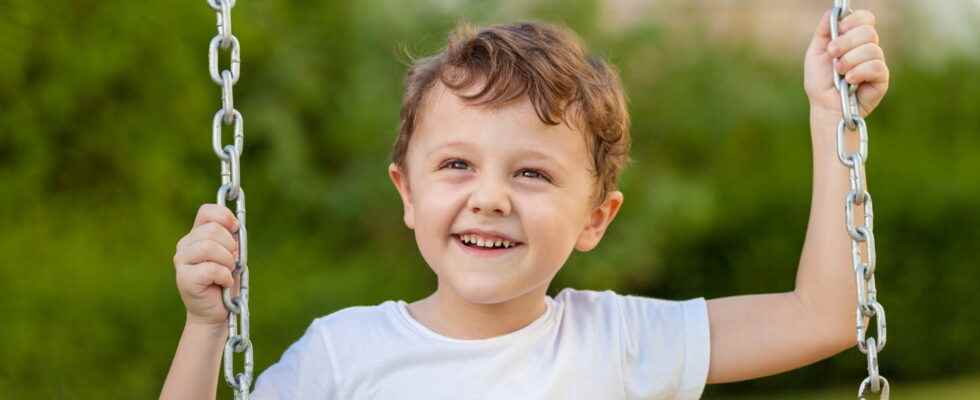Difficulties in pronouncing “s” and “ch” are frequent and considered normal until the loss of baby teeth. What to do if these language disorders persist? We take stock with Françoise Garcia, speech therapist and vice-president of the National Federation of Speech Therapists.
Lisp, lisp, hiss… So many small pronunciation defects that can accompany language learning. If they stay quite common in children under 6 years oldwhen the overall maturation of the dental joint is complete, they may nevertheless persist and require the consultation of a Speech Therapist.
Why is my child lisping?
Some factors favor the development of lisping (or hissing) such as thumb or pacifier sucking excessively. Also, other children retain a primary infantile swallowing: the tongue is advanced between the incisors and prevents the upper and lower teeth from touching. Result : the child mispronounces the “s” or the “z”, hence a lisp. Moreover, “if the child is still swallowing or sucking, his cheeks will not yet be toned enough to pronounce certain sounds like the “ch”specifies Françoise Garcia before adding that it is only during growth that the tongue will naturally lodge behind the incisors“. On the other hand, dental deformities can also affect the correct pronunciation of certain sounds.
“Hair on the tongue” or deeper language disorder?
The lisping only becomes a disorder when the overall maturation of the dental articulation is complete and the child continues to have a language defect. “The child’s articulation is perfectible over the months and his ability to pronounce certain letters will evolve with age. Indeed, the “s” or the “ch”, are among the sounds that are pronounced better later than the “a” or the “o” for example“. Before the age of 6, the child may have other linguistic disorders which may prevent him from understanding what is said to him, from making sentences or from not finding the right words to express himself: language alterations which are often imperceptible. Hence the importance of ensuring that the child validates all the language stages. “Some parents focus on what they hear without going to explore the child’s syntax, global comprehension or phonology when these elements are more important than the articulatory disorder“, adds the speech therapist. Finally, it is important to know if the child under 6 years old correctly perceives the difference between an “s” and a “ch” when we speak. If so, this means that he has a good perception of sounds and that he only presents a lack of motor realization linked to maturation. If the child does not make this phonological difference, there may be an underlying problem and a language assessment is needed.
“Before the age of 6, it is not useful to consult a speech therapist”
At what age should you consult a speech therapist for your child?
Isolated lisping (or hissing) is not considered a disorder until the loss of deciduous teeth and the appearance of permanent teeth, i.e. between 5 and 6 and a half years, and has every chance of disappearing naturally. Before, it is not useful to consult a speech therapist. Indeed, not only the points of articulation of the children will evolve during the secondary swallowing then “the speech therapist will use a support of the tongue on the teeth to pronounce the “s” and the “z” (the two sounds concerned by the lisp), this rehabilitation position is then only possible when the teeth definitive appeared“, specifies the expert. As soon as his teeth are formed, but pronunciation defects persist, a speech therapist can be called in, alongside orthodontist support when necessary, to help the child position correctly their tongue in order to pronounce all the sounds.The child can then work on each point of articulation through exercises, songs, listening games or grimaces, language interaction and daily stimulation to help him acquire the agility of his language.Note that speech therapy is reimbursed by health insurance at 60% and by mutual insurance for the rest.
“You can only improve your language… by practicing and doing so every day!“, says Françoise Garcia before specifying “that‘it is useless to have the word repeated, insistently, until it is pronounced correctlyespecially if the word remains understandable despite this“. Indeed, the child may tense his tongue, become stressed or even offended and his lisping may even intensify. It is better to arrange playful moments where the child will have to make a special effort to listen well to each word. and try to repeat them appropriately. It is by using a wide range of different words, allowing him to be more attentive and more attentive to the articulatory movements of his interlocutors that he will, by mimicry, try to reproduce what he hears or sees. This work will be reinforced during speech therapy sessions for children in more difficulty. Finally, suggest that he gradually give up the thumb or the pacifier and listen to him : sometimes a lisp indicates a fear of growing up, a lack of confidence or a way to get your attention.
